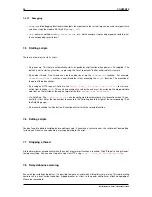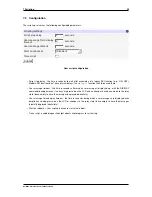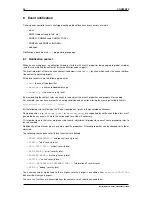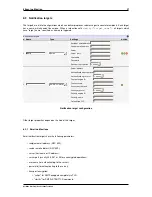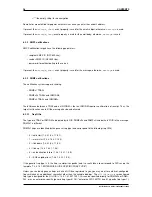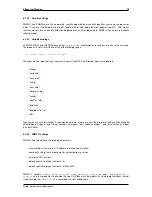
10 External APIs
37
The engine ID identifies the device, and plays an important role in SNMPv3, in particular in authentication and
encryption. It will normally be autodetected by management software (SNMP clients), but you may save it for future
reference (the default value is based on the device factory MAC address). You can even change it; however, if you
do, all passwords for SNMPv3 users will be invalidated as they are stored in a localized form to improve security.
SNMP v1 and v2c do not have a notion of 'users'. Instead, a 'community string', acting as a shared secret, is
transferred in requests in plain text. The following table allows to configure how community strings are mapped to
the above users.
SNMP communtities
Community
IP address
Netmask
Mapped username
private
192.168.0.0
255.255.255.0
powerAdmin
public
192.168.0.0
255.255.255.0
powerReader
powerAdmin
Submit
SNMP community-to-user mapping configuration
In this example, requests with the 'private' community string will be serviced as though they were made by the
'powerAdmin' user if they come from the 192.168.0.x subnet, and denied otherwise. Likewise, requests with the
'public' community string coming from the same subnet will be served as the 'powerReader' user.
10.6
SNMP energy object MIB support overview
The Net-SNMP agent included in DIN4 has built-in support for several well-known MIBs, but none of them deal with
power control. The power-control-related ENERGY-OBJECT-MIB is described in RFC 7460, and is supported in the
following manner:
• the root of the OID tree is at 1.3.6.1.2.1.229 as per RFC;
• the objects are relays, with indices starting at 1 ;
• the current actual power states are indicated in the
eoPowerOperState
(1.3.6.1.2.1.229.1.2.1.9) table;
• the assigned (expected) power states can be manipulated in the
eoPowerAdminState
(1.3.6.1.2.1.
←
-
229.1.2.1.8) table;
• supported power states are
ieee1621Off
(257) and
ieee1621On
(259) only
Additionally, among others, the following potentially useful parts of the above MIB are implemented:
• eoPowerStateTotalTime;
• eoPowerStateEnterCount.
These accumulate relay state statistics. Note that those don't persist across device reboots.
The following parts of the above MIB are NOT implemented:
• eoEnergyParametersTable;
• eoEnergyTable;
DLI DIN4 User’s Guide: 20170809T111540Z
Summary of Contents for DIN4
Page 1: ...DLI DIN4 User s Guide 20170809T111540Z ...
Page 57: ......


